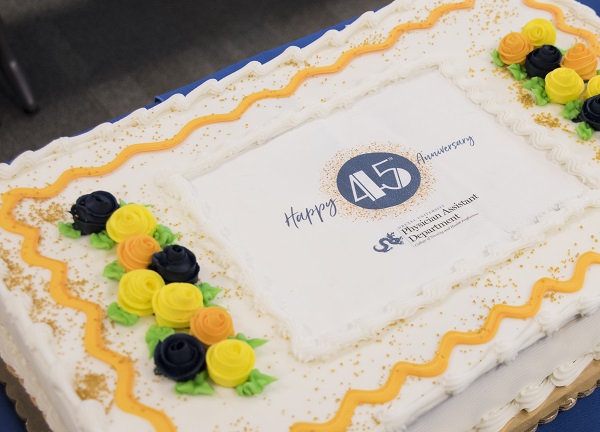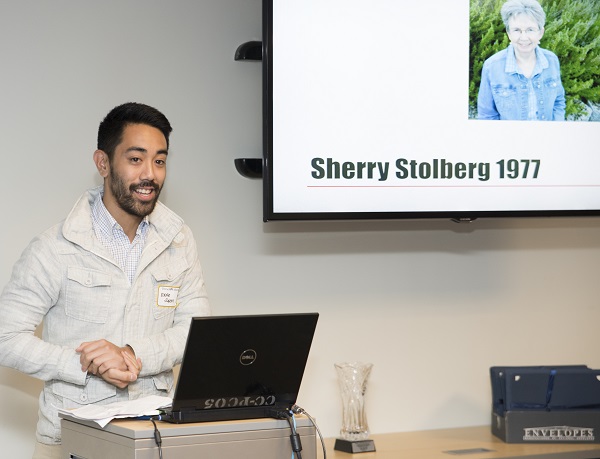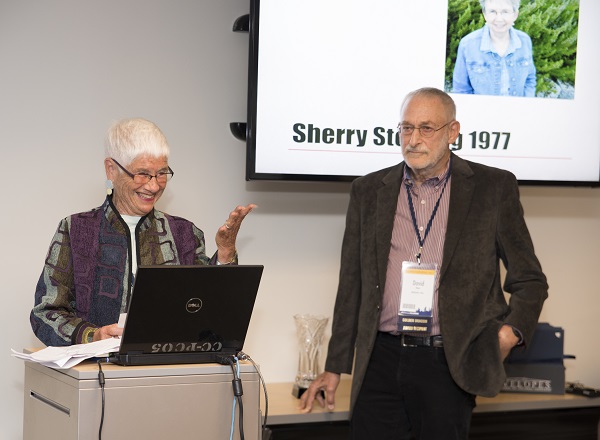45th Anniversary Celebration
October 30, 2017
 The physician assistant program at the College of Nursing and Health Professions celebrated a big milestone; its 45th Anniversary. Interim Dean Sue Smth, PhD, PT greeted all attendees welcoming them to the 45th anniversary celebration of the Hahnemann/Drexel Physician Assistant Program. Smith, in her comments, noted that the College of Nursing and Health Professions takes pride in its program faculty who collectively have over 120 years of teaching experience and remain committed to the mission: Educate qualified primary care PAs. Improve healthcare deliver in rural and urban medically underserve areas. Promote the PA Profession. The history of the program below was written by clinical professor and its current department chair, Pat Auth, PhD, PA-C '85 and shared at a celebration that attracted more than 100 people over Alumni Weekend last May.
The physician assistant program at the College of Nursing and Health Professions celebrated a big milestone; its 45th Anniversary. Interim Dean Sue Smth, PhD, PT greeted all attendees welcoming them to the 45th anniversary celebration of the Hahnemann/Drexel Physician Assistant Program. Smith, in her comments, noted that the College of Nursing and Health Professions takes pride in its program faculty who collectively have over 120 years of teaching experience and remain committed to the mission: Educate qualified primary care PAs. Improve healthcare deliver in rural and urban medically underserve areas. Promote the PA Profession. The history of the program below was written by clinical professor and its current department chair, Pat Auth, PhD, PA-C '85 and shared at a celebration that attracted more than 100 people over Alumni Weekend last May.
The program was established in 1971 at the Hahnemann Medical College and Hospital. It is among the oldest in the country, matriculates one of the largest classes each year, and has a long history of innovation in primary care education for physician assistants while addressing its mission to improve healthcare in rural and urban underserved communities.
The PA Program has graduated thousands of physician assistants, with 40 percent practicing in primary-care settings and the remainder practicing within a range of medical and surgical disciplines and sub-disciplines. Additionally, 25 percent of graduates practice in either urban or rural medically underserved communities across the United States and foreign countries. More than 20 percent of the graduates are members of minority groups acknowledged to be underrepresented in the healthcare profession.
Each entering class is chosen from a national and international applicant pool with students from across the United States and other countries. Representation of recognized minorities is among the highest in the nation. The program's selection of students includes a widely diverse group in relation to age, ethnicity, prior education, healthcare experience, and people-oriented activities.
The Physician Assistant Program is now part of Drexel University, a leader in innovative, technologically advanced higher education and home to one of the largest private medical schools—Drexel College of Medicine—in the country. The program is located on the university's Health Sciences Campus adjacent to the Hahnemann University Hospital in Center City, Philadelphia. Additional clinical affiliation sites available to PA students are located throughout the greater Philadelphia region, the entire East Coast, and numerous other locales across the country.
 During the spring event, Edward Suppan, the president of PA Class of 2018, thanked all of the alumni for their dedication to the CNHP's PA Program. Auth thanked Nate Alston for his long history of service to the PA profession, especially for his dedication to promoting the physician assistant profession in Pennsylvania and
During the spring event, Edward Suppan, the president of PA Class of 2018, thanked all of the alumni for their dedication to the CNHP's PA Program. Auth thanked Nate Alston for his long history of service to the PA profession, especially for his dedication to promoting the physician assistant profession in Pennsylvania and
Evelyn Eskin, MAB and David Major, MD, a co-founder of the program, were given an award named after Sherry Stolberg, PA-C, one of the longest standing directors to lead the mission of the program and the education of its wonderful students. Major and Wilbur Oaks, MD, co-founded a program to train the best primary care physician assistants which Eskin directed. Stolberg grew the program during her tenure always keeping the focus on students. “As Pat and I always say, our compass as directors of PA programs has always been the students—it's all about the students,” she wrote in a note because she couldn’t be there in person. To Eskin and Major, she wrote that she couldn’t think of two more deserving people to receive the award.
Below are Eskin’s thoughts on the evolution of the PA program which appeared in a piece she wrote for PSPA News recently.
My introduction to the PA program came in the fall of 1970 in the form of two bulging shopping bags. Dave, a brand new faculty member in the department of medicine at what was then called Hahnemann Medical College, arrived home one evening with these two gigantic shopping bags overflowing with all kinds of paper. It seemed that Bill Oaks, the legendary and visionary chairman of the Department of Medicine, had an idea to create the third PA program in the country. To announce this program, he did what people did before there were social media -he put an ad in the Philadelphia Inquirer. The bags contained the responses to "if you are interested, reply to....". There was no curriculum, no application process, no faculty -just dozens of people who were interested in being PAs. Dave, as the junior faculty member, was asked to make some sense out of it.
To say that Dave had no time for this is an understatement. I said I'd give it a shot. Thus the first application form was developed, admission criteria were established, an interview process evolved, and the first class of ten PA students arrived nine months later. I was given the title of admissions director. In the intervening months, the curriculum was developed by Bill and Dave during several late night and weekend meetings, and the faculty were recruited from among the physicians at Hahnemann.
As the program began, there was a part-time program director and no dedicated staff. I continued as the admissions director and was itching to do more. Bill said that he had confidence that I could do the job of program director, but he couldn't hire me without a graduate degree.
Bill said that he had confidence that I could do the job of program director, but he couldn't hire me without a graduate degree.
I got a graduate degree, and, in 1977, I got the job!
Our years in the PA program were among the most gratifying and fulfilling of our careers. There was always a sense of adventure, the encouragement to dream, and a can-do attitude. The students were amazing - smart, motivated, and endlessly interesting. It was a wonderful ride and a magical time.
The PA Program at Hahnemann/ Drexel has always had a big heart and soul. The faculty are unusually devoted and capable. The stability of the leadership is indeed impressive; I had the shortest tenure at seven years. Sherry Stolberg succeeded me in 1984, and Pat Auth followed her 20 years later. Both are graduates of the program, and totally committed to its quality and continued success. Sherry was a wonderful student, friend, leader and a role model for faculty and students, and it is an honor for us to receive this award named for her.
The commitment of faculty, staff, alumni and students to the profession is evident through the stories and experiences shared that night. The esteem of CNHP’s program is well known throughout the country and it all due to the founders and those who carry on their legacy.